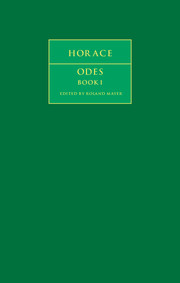Introduction
Summary
LYRIC IMPULSE AND LYRIC CHALLENGE
me doctarum hederae praemia frontium
dis miscent superis, me gelidum nemus
Nympharumque leues cum Satyris chori
secernunt populo, si neque tibias
Euterpe cohibet nec Polyhymnia
Lesboum refugit tendere barbiton.
These lines of Horace’s first and programmatic ode suggest to us at least one reason why he tackled the challenge of composing lyric poems in Latin. His earliest success had been in the native Roman genre of satire. The subject matter of satire was everyday life, and its characteristic tone was critical. The writer of satire – he might not even regard himself as a poet (cf. S. 1.4.39–42) – had therefore to keep his feet on the ground. The lyric poet on the other hand escaped the world of everyday (secernunt populo), he removed himself to a cool grove, far away from the heat of the town, where he joined the dance with nimble Nymphs and Satyrs. Nymphs and Satyrs of course only exist in an imagination nurtured on literary tradition (doctus), not in the satirist’s real world. The imagination of the lyric poet, who now dons the persona of the uates (cf. 31.2), is inspired by Muses (Euterpe and Polyhymnia); the satirist needed no such assistance, nor was he doctus, in the way that a lyric poet was. Lyric is thus presented in these lines as something both liberating and demanding.
The liberating power of lyric was generated above all by its diversity as a genre. To a Roman reader and poet the Greek tradition of lyric song was presented as a ‘canon’ of nine poets, whose range of themes and tones answered human experience far more fully than the restricted scope of Roman satire. On transforming himself into a lyric uates, Horace could deal with more varied issues and situations, which all had different and appropriate tones of voice for him to develop. This variety was part and parcel of the tradition of lyric composition which he appropriated from Greece. Greek lyric was polymorphous, thanks to the service of song in occasions public (praise, lament, prayer) and private (love and friendship, the symposium). The lyric tradition thus kept Horace linked to a realistic world in which men and women fall in love, enjoy a drink together (Carm. 20), need consoling for the loss of loved ones (Carm. 24), pray to the gods (Carm. 21, 30, and 31), or are moved either to celebrate congenial divinities in hymns (Carm. 10, 21) or to secure the favour of a potentially dangerous one (Carm. 35). Such situations are common, but lyric treatment invited greater refinement than the satires; in the satires, for instance, men have dinner together, in the lyrics they meet for symposia (Carm. 20 and 27). Fantasy too is liberated and refined by the lyric: in the fourth ode, Horace envisages a springtime in which Venus dances beneath the moon with her retinue of Nymphs and Graces, engaging figures who had not appeared in Latin poetry before Horace. Satire could not rise above a farting Priapus (S. 1.8.46–7).
- Type
- Chapter
- Information
- Horace: Odes Book I , pp. 1 - 20Publisher: Cambridge University PressPrint publication year: 2012



